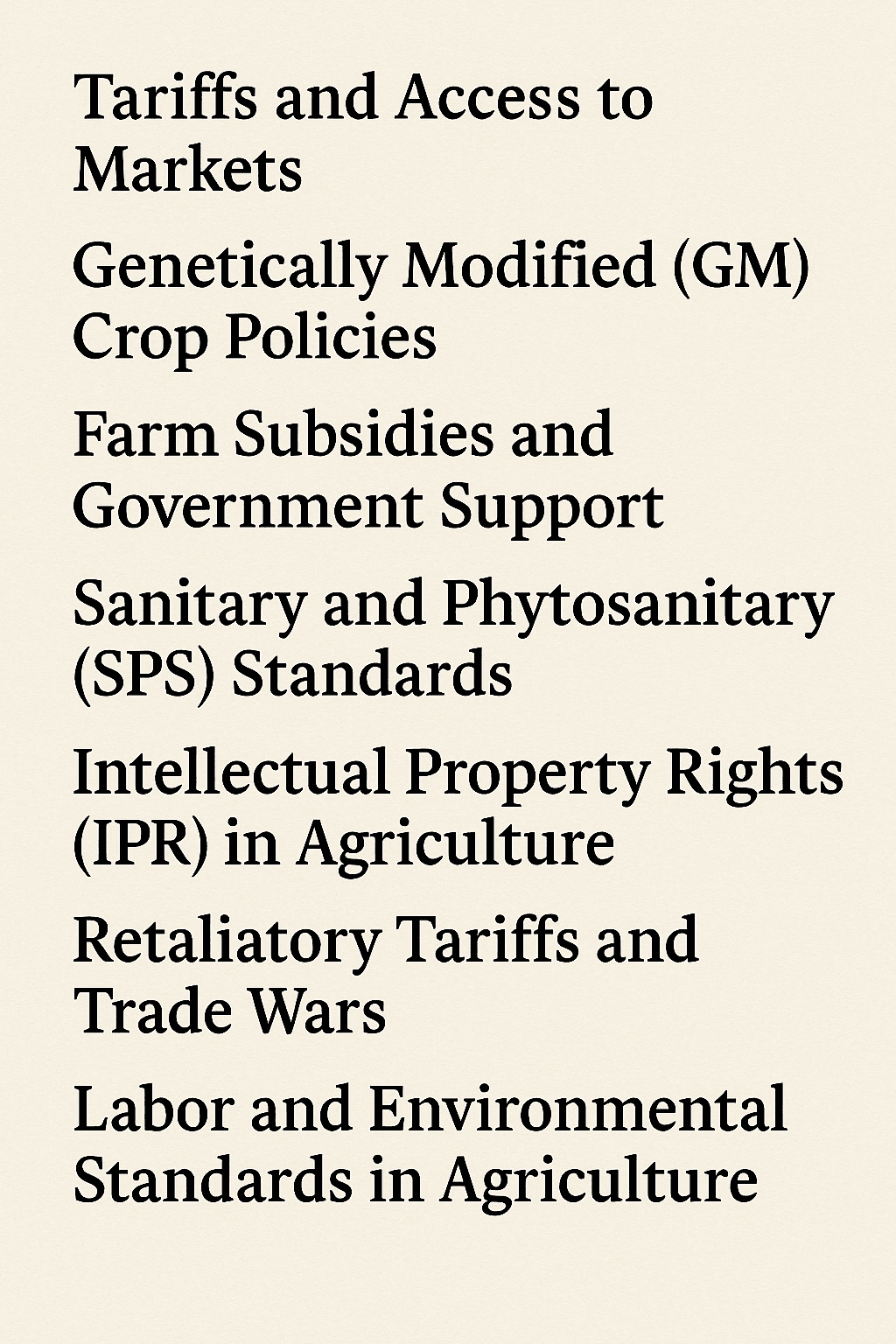“Key Agricultural Issues Shaping India-US Trade Relations”

“Key Agricultural Issues Shaping India-US Trade Relations”
Trade relations between India and the United States have evolved significantly, but agricultural trade remains a critical point of contention. While both nations benefit from a range of economic exchanges, agricultural trade issues have proven difficult to resolve. These challenges stem from various factors, such as tariffs, biotechnology, subsidies, and more. This article explores the “Key Agricultural Issues Shaping India-US Trade Relations”
- 1. Tariffs and Access to Markets
A central issue in India-US agricultural trade discussions is the imposition of high tariffs. The United States has often criticized India for maintaining significant tariffs on American agricultural products like dairy, apples, and almonds. The high tariff structure limits the accessibility of US goods in India’s marketplace, which undermines potential exports.
From India’s perspective, tariffs are crucial for protecting the domestic farming industry. India’s agriculture relies heavily on small-scale farmers who could be adversely affected by cheaper imports. As such, India has been hesitant to agree to tariff reductions. Both countries are striving to balance the protection of local agricultural interests with expanding market access in a way that benefits both economies.
- 2. Genetically Modified (GM) Crop Policies
Genetically modified (GM) crops are a hotly debated topic in agricultural trade talks. The US is a strong proponent of GM crops and has urged greater acceptance of these technologies, citing their potential to increase crop yields and reduce the reliance on pesticides. Products like GM corn, soybeans, and cotton from the US are commonly included in trade discussions.
However, India has adopted a cautious stance regarding GM crops. The country has stringent rules and regulations in place concerning the approval of GM crops, especially in the food sector. India has yet to fully embrace GM technology, primarily due to concerns over environmental impacts and food safety. This divide between the US’s push for market access for GM products and India’s caution presents a significant challenge in agricultural trade negotiations.
- 3. Farm Subsidies and Government Support
Another contentious issue in India-US agricultural trade talks is the question of government subsidies. India’s agriculture sector receives extensive government support, including price supports for key crops such as rice and wheat. These subsidies are intended to protect domestic food security and ensure stable incomes for farmers.
The United States, however, argues that such subsidies distort international trade by making Indian agricultural products artificially cheap, giving them an unfair advantage in global markets. The US wants India to scale back these subsidies in line with global trade rules. India, on the other hand, defends these subsidies as essential to ensuring food security for its population, given the scale of its agrarian economy. This disagreement complicates negotiations on agricultural trade between the two nations.
- 4. Sanitary and Phytosanitary (SPS) Standards
Sanitary and phytosanitary (SPS) measures—related to food safety and plant and animal health—are a recurring point of friction in trade discussions. Both India and the US have raised concerns about each other’s SPS regulations, especially regarding the safety standards for food products and the export of livestock.
India has expressed dissatisfaction with US SPS measures, particularly concerning the levels of pesticide residue allowed on imported food products. Conversely, the United States has highlighted issues with India’s SPS measures that could potentially restrict the export of products like poultry and meat. These differences in health and safety standards create barriers to trade, preventing the free flow of agricultural goods between the countries.
- 5. Intellectual Property Rights (IPR) in Agriculture
Intellectual Property Rights (IPR) remain another area of concern, particularly in the realm of agricultural biotechnology. US agricultural firms seek stronger IPR protections for their products, especially for genetically modified seeds and other biotech innovations. The US argues that these protections are vital to incentivizing innovation and ensuring the competitiveness of American agricultural products globally.
India has shown reluctance to adopt stringent IPR measures in agriculture, fearing that it could increase the cost of inputs for its farmers, particularly in seed procurement. Many farmers in India rely on traditional seed-saving practices, and more robust IPR enforcement could threaten their access to affordable seeds. As a result, the tension between fostering innovation and protecting the interests of Indian farmers remains a major point of contention.
- 6. Retaliatory Tariffs and Trade Wars
The broader context of global trade tensions also affects the agricultural trade between India and the US. In recent years, both countries have engaged in trade wars, imposing retaliatory tariffs on various products, including agricultural goods. For example, India has imposed tariffs on US goods like almonds and apples in response to US tariffs on Indian products like steel.
These retaliatory measures have exacerbated the challenges faced by agricultural exporters. With each country taking a defensive stance, the imposition of tariffs complicates negotiations and reduces the predictability of trade, making it harder for farmers in both countries to plan and expand their agricultural exports.
- 7. Labor and Environmental Standards in Agriculture
Labor and environmental concerns are increasingly influencing agricultural trade negotiations. The US has raised issues regarding labor conditions in Indian agriculture, urging India to improve labor rights in farming. At the same time, India has expressed concerns over the US’s environmental practices in agriculture, particularly in relation to water usage and sustainability.
Agricultural practices in both countries must align with international labor and environmental standards. This includes ensuring fair labor practices for farm workers and adopting sustainable farming methods that protect the environment. These broader issues complicate negotiations, as both nations aim to secure trade agreements that reflect both labor and environmental considerations.
- Conclusion
Agricultural trade between India and the US is complicated by a range of issues, from tariff barriers to biotechnology concerns. Both nations have significant economic interests at stake, and resolving these thorny agricultural issues will require compromise and careful negotiation. Addressing concerns related to tariffs, GM crops, subsidies, SPS measures, IPR protections, retaliatory tariffs, and labor and environmental standards will be key to fostering a more balanced and sustainable agricultural trade relationship between the two countries.
As both nations continue to negotiate, the hope is that they can find common ground on these critical issues, creating a more favorable environment for agricultural trade and cooperation in the future.




